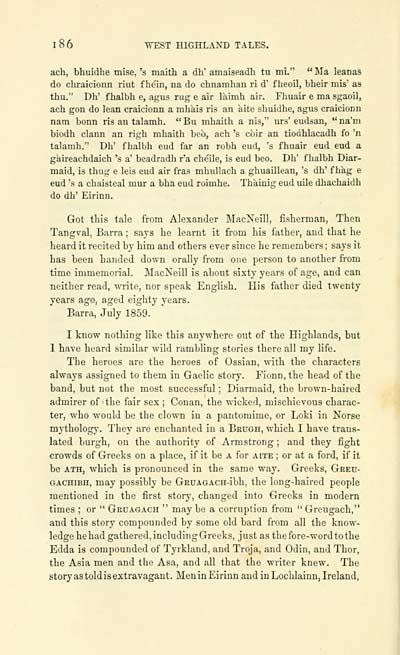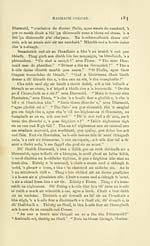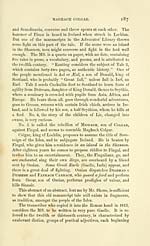Download files
Complete book:
Individual page:
Thumbnail gallery: Grid view | List view

I 8 6 WEST HIGHLAXD TALES.
ach, bhuidhe mise, 's maith a dh" amaiseadh tu mi." " Ma leanas
do chraicionn riut f hein, na do chnamhau ri d' f lieoil, bheir mis' as
thu." Dh' fhalbh e, agus rug e air Ihimh air. Fhuair e ma sgaoil,
ach gon do lean craicionn a mlikis ris an aite shuidhe, agus craicionn
nam bonn ris an talamh. " Bu nihaith a nis," urs' eudsan, " na'm
biodh clann an righ mhaith beo, ach 's coir an tiodhlacadh fo 'n
talamh." Dh' fhalbh end far an robh eud, 's fhuair eud eud a
gaireachdaich 's a' beadradh r'a cheile, is eud beo. Dh' fhalbh Diar-
maid, is thug e leis eud air fras mhullach a ghuaillean, 's dh' f hag e
eud 's a chaisteal mur a bha eud roimhe. Thainig eud uile dhachaidh
do dh' Eirinn.
Got this tale from Alexander MacNeill, fisherman, Then
Tangval, Barra ; says he learnt it from his father, and that he
heard it recited by him and others ever since he remembers ; says it
has been handed down orally from one person to another from
time immemorial. MacNeill is about sixty years of age, and can
neither read, write, nor speak English. His father died twenty
years ago, aged eighty years.
Barra, July 1859.
I know nothing like this anywhere out of the Highlands, but
1 have heard similar wild rambling stories there all my life.
The heroes are the heroes of Ossian, with the characters
always assigned to them in Gaelic story. Fionn, the head of the
band, but not the most successful ; Diarmaid, the brown-haired
admirer of the fair sex ; Conan, the wicked, mischievous charac-
ter, who ■would be the clown in a pantomime, or Loki in Norse
mythology. They are enchanted in a Beugh, which I have trans-
lated burgh, on the authority of Armstrong ; and they fight
crowds of Greeks on a place, if it be a for aite ; or at a ford, if it
be ATH, which is pronounced in the same way. Greeks, Gred-
GACHiBH, may possibly be GRUAGACH-ibh, the long-haired people
mentioned in the first story, changed into Greeks in modern
times ; or " Gruagach " may be a corruption from " Greugach,"
and this story compounded by some old bard from all the know-
ledge he had gathered, including Greeks, just as the fore-word to the
Edda is compounded of Tyrkland, and Troja, and Odin, and Thor,
the Asia men and the Asa, and all that the writer knew. The
story as told is extravagant. Men in Eirinn and in Lochlainn, Ireland,
ach, bhuidhe mise, 's maith a dh" amaiseadh tu mi." " Ma leanas
do chraicionn riut f hein, na do chnamhau ri d' f lieoil, bheir mis' as
thu." Dh' fhalbh e, agus rug e air Ihimh air. Fhuair e ma sgaoil,
ach gon do lean craicionn a mlikis ris an aite shuidhe, agus craicionn
nam bonn ris an talamh. " Bu nihaith a nis," urs' eudsan, " na'm
biodh clann an righ mhaith beo, ach 's coir an tiodhlacadh fo 'n
talamh." Dh' fhalbh end far an robh eud, 's fhuair eud eud a
gaireachdaich 's a' beadradh r'a cheile, is eud beo. Dh' fhalbh Diar-
maid, is thug e leis eud air fras mhullach a ghuaillean, 's dh' f hag e
eud 's a chaisteal mur a bha eud roimhe. Thainig eud uile dhachaidh
do dh' Eirinn.
Got this tale from Alexander MacNeill, fisherman, Then
Tangval, Barra ; says he learnt it from his father, and that he
heard it recited by him and others ever since he remembers ; says it
has been handed down orally from one person to another from
time immemorial. MacNeill is about sixty years of age, and can
neither read, write, nor speak English. His father died twenty
years ago, aged eighty years.
Barra, July 1859.
I know nothing like this anywhere out of the Highlands, but
1 have heard similar wild rambling stories there all my life.
The heroes are the heroes of Ossian, with the characters
always assigned to them in Gaelic story. Fionn, the head of the
band, but not the most successful ; Diarmaid, the brown-haired
admirer of the fair sex ; Conan, the wicked, mischievous charac-
ter, who ■would be the clown in a pantomime, or Loki in Norse
mythology. They are enchanted in a Beugh, which I have trans-
lated burgh, on the authority of Armstrong ; and they fight
crowds of Greeks on a place, if it be a for aite ; or at a ford, if it
be ATH, which is pronounced in the same way. Greeks, Gred-
GACHiBH, may possibly be GRUAGACH-ibh, the long-haired people
mentioned in the first story, changed into Greeks in modern
times ; or " Gruagach " may be a corruption from " Greugach,"
and this story compounded by some old bard from all the know-
ledge he had gathered, including Greeks, just as the fore-word to the
Edda is compounded of Tyrkland, and Troja, and Odin, and Thor,
the Asia men and the Asa, and all that the writer knew. The
story as told is extravagant. Men in Eirinn and in Lochlainn, Ireland,
Set display mode to: Large image | Transcription
Images and transcriptions on this page, including medium image downloads, may be used under the Creative Commons Attribution 4.0 International Licence unless otherwise stated. ![]()
| Early Gaelic Book Collections > J. F. Campbell Collection > Popular tales of the West Highlands > Volume 2 > (204) |
|---|
| Permanent URL | https://digital.nls.uk/81419509 |
|---|
| Description | Volume II. |
|---|---|
| Shelfmark | Cam.2.g.4(2) |
| Attribution and copyright: |
|
| Description | Orally collected with a translation by J.F. Campbell. |
|---|---|
| Shelfmark | Cam.2.g.4(1-4) |
| Additional NLS resources: | |
| Description | Volumes from a collection of 610 books rich in Highland folklore, Ossianic literature and other Celtic subjects. Many of the books annotated by John Francis Campbell of Islay, who assembled the collection. |
|---|
| Description | Selected items from five 'Special and Named Printed Collections'. Includes books in Gaelic and other Celtic languages, works about the Gaels, their languages, literature, culture and history. |
|---|

